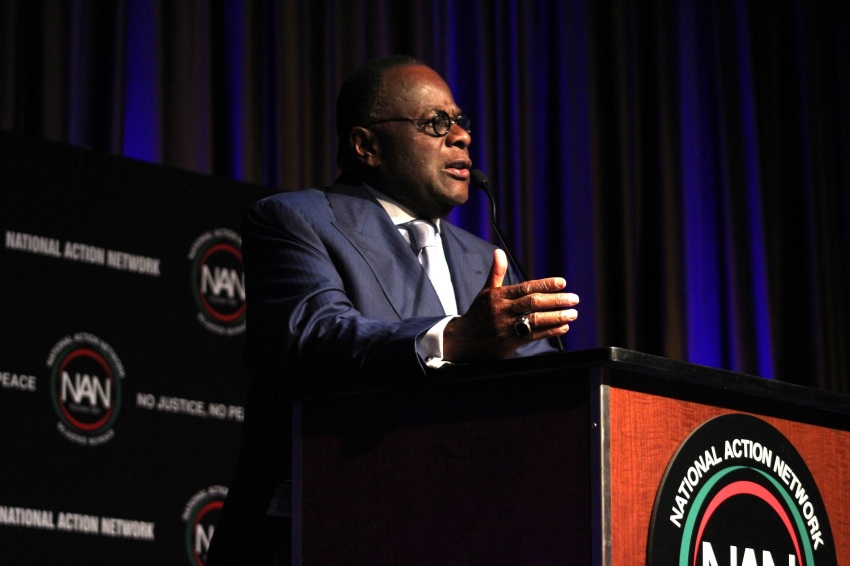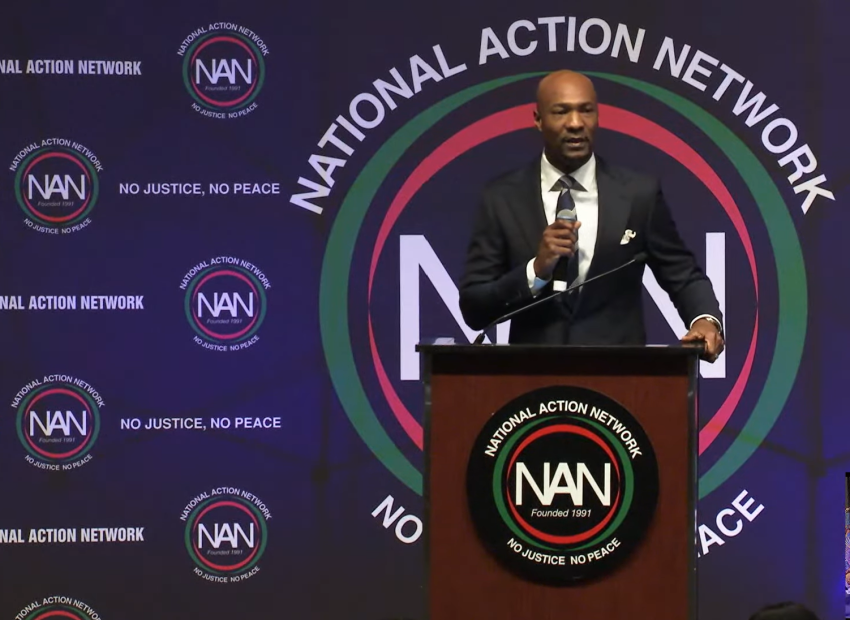Pastor Franklyn Richardson: ‘Black Church cannot be understood separately from civil rights movement’

NEW YORK — W. Franklyn Richardson, senior pastor of Grace Baptist Church in the city of Mount Vernon, N.Y., and chairman of the board of the Rev. Al Sharpton's civil rights organization, National Action Network, suggested that the “Black Church cannot be understood separately from the civil rights movement” because faith leaders and “the Church” are key drivers of the movement.
“The Church exists within and underlies every aspect of the movement, from its leaders to the devotion, tenacity and hope that keep it strong,” Richardson said during the minister’s luncheon at NAN’s annual convention last Friday. “It is our faith and our community that give us the resilience, every day, to continue the fight for justice.”
The intertwined history of the civil rights movement and the Black Church was reflected in the dedicated programming at the NAN convention featuring ministers.
Bishop J. Drew Sheard, presiding bishop of the Church of God in Christ, a 6 million-member predominantly African American Holiness Pentecostal denomination, who spoke at the same luncheon, talked about the role of faith and social justice.
“Almost exactly 60 years ago, the Reverend Dr. Martin Luther King Jr. led thousands of Americans to march for a shared vision of justice and equality,” Sheard, who leads the Greater Emmanuel Institutional in Detroit, Michigan, said. “Today, we gathered to honor his legacy as an activist and as a man of God, whose faith drove his tireless efforts to bring about change in this country. Now more than ever, we need our faith to guide us toward a more just America.”
The luncheon came just a day after Keion Henderson, the founder, CEO and senior pastor of The Lighthouse Church & Ministries in Houston, Texas, called on black Americans to develop an “effective Negro strategy” to challenge efforts to disenfranchise the black community during a “Truth to Power Revival” held during the conference on Thursday night.
“The African American experience over the last 400 years has been very tumultuous. But I want to use for a subject today for those of y'all who will use this word later on in your life, I want to just talk about, there's a crack in the curse,” Henderson said of the black American experience.
He said that even though much effort has been made to paint black people as a race without history, the story of black people can be found in the Bible.
“I want to ensure that I fuse within the expression of this message both the Gospel and the plight of the African American experience. For far too long, I believe that we, as a people, have been led to believe that there is a difference between our history and the Scripture,” Henderson said. “But I am here to tell you they are one and the same.”
He then, as a part of his message highlighting black characters in Scripture, such as Moses’ mother.
“If I can be controversial, I'd rather do it up front. Moses' mama was black. If we just gon' pick a fight, let's just talk about his wife, Zipporah, who was a black woman. The Bible says in Numbers Chapter 12, she was a Cushite. And the area Kush is between Sudan and those places, Somalia in Africa, and the Bible even says that her skin was made black by the sun,” Henderson explained.
“If we just go and pick a fight, let's talk about the Shunammite woman who made the meal for Elijah and was the first black woman in the Scripture to show us hospitality. Let's talk about the fact that when David was looking at a woman perched in a bathtub on a rooftop, if we were able to interview him and ask him why did he pick her out of all of the women he could have picked, he probably would tell you, ‘cause she was a sister and he never seen nothing like that before,” Henderson quipped.

The Texas preacher outlined the cursed course of disenfranchisement blacks have suffered from the slave trade and systemic racism and oppression in America to the challenges of the present day.
“This is the first generation in the history of our country that feels that things are not going to get better. We've always had optimism that things were going to get better. But this is the first generation that has to wonder, will Social Security actually be there when I matriculate to retirement in age?” he said.
“Will home ownership be available to me since there is a company that you've never heard of called BlackRock that has $10 trillion worth of assets under holdings right now that owns 70% of your neighborhoods, which is going to really quickly become you won't be able to buy a home because the people with the money will always own them,” he added.
He also pointed out how increasing automation was decimating jobs, reflecting a bleak picture for future employment.
“This is the first time in America where nobody told young black people at their college commencement speeches that in 2023 you are going to have to be a CEO to afford a dozen eggs. Nobody told us,” Henderson said.
“You let me tell you what you told us. You told us if we graduated from high school. You told us if we went to college and got a degree that we would be able to come out and have a job. Now you got people with college degrees working at Burger King. Technology is replacing human beings, robots are parking cars, McDonald's has unmanned restaurants. The question is where? Where's the land? Where is this hope you promised us?” he asked. “Where is this dream that we were told would be here? Where is this equality [that] … we will live in a nation where we would not be judged by the color of our skin, but by the content of our character?”
Henderson noted that despite all the challenges black Americans have faced over the course of history, people have continued to find ways to survive and thrive.
“If we're going to break this curse, we must design an effective Negro strategy. We can't just fight this war marching down the double yellow stripe lines down our urban streets. If we're going to fight this war and get clean water in Jackson and Flint, we got to find more preachers, workers who can sit behind the correspondent desk at MSNBC and know how to march and speak to power,” he said. “You've got to understand that something has happened to us. But it is our job to overcome what has happened to us.”
He then shared his own story of overcoming the odds as the illegitimate son of a pastor who he never knew was his father until his death.
“You stand and look at … the illegitimate son of a man who was the pastor of the church that I attended, and I did not know he was my father but always knew he was my pastor,” Henderson said.
He said his father, who he only knew as his pastor, idolized Sharpton, but they never met.
“My father talked to me every day about how Al Sharpton was his hero and he died never acknowledging me as his son. But little did he know that there was a crack in the curse, because the boy that he did not claim will be standing on the platform of his hero,” the Houston pastor said. “And I came to tell somebody in here today, it don't matter how you start. It matters how you finish, and somebody should have told America once you go black you never go back.”



























